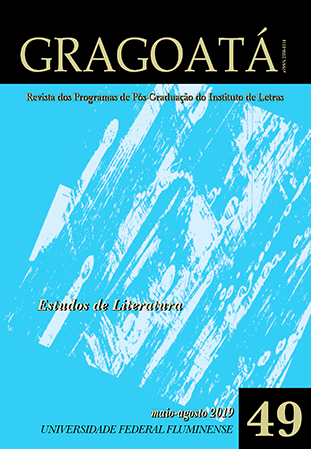Poetics of "being-with" in 'I tu', by Cecília Vicuña: considerations on translation as performance
DOI:
https://doi.org/10.22409/gragoata.v24i49.34105Keywords:
Cecília Vicuña, latin american literature, translation, performance.Abstract
This article discuss a translation problem presented in poetics characterized by the hybridism among languages, as the poetics of being-with, read in texts by Cecília Vicuña. The plot composed by the writer, in I tu (2004), among Spanish, English, Quechua, Guarani, Greek and Latin, provokes both a great challenge for an eventual translation and a questioning about the possibility of thinking a space for the suspension of translation as linguistic transcoding, giving rise to the contact between heterogeneous languages and cultures, whose hierarchical as well as power relations are subverted; it would not be a translation from one language to another, but it would provoke listening to the foreigner in an ethical dimension. The creation of this "other" language is thought of as "heterotopia" (FOUCAULT, 2013), as a counter space for contestation of linguistic hegemony; and from this text turned into literary space, the reader turns himself into a translator, searching for the diction, timbre and rhythm of the foreign languages envolved. Reflection leads to thinking about the relationships between text, translation and performance, from a minimal degree, such as that of the silent reading (ZUMTHOR, 2007), to the poetic performances by Cecília Vicuña. The text read aloud and/or the performance of oral poetry in diverse environments amplifies these spaces of "tradicção" (FLORES and GONÇALVES, 2017), of remission of the letter to the body and of the body to the letter, where, sometimes, the understanding of the text may not be the essential component, but instead the sensitive sharing of a listening time.
Downloads
Downloads
Published
How to Cite
Issue
Section
License
Authors who publish in Gragoatá agree to the following terms:
The authors retain the rights and give the journal the right to the first publication, simultaneously subject to a Creative Commons license CC-BY-NC 4.0, which allows sharing by third parties with due mention to the author and the first publication by Gragoatá.
Authors may enter into additional and separate contractual arrangements for the non-exclusive distribution of the published version of the work (for example, posting it in an institutional repository or publishing it in a book), with recognition of its initial publication in Gragoatá.

Gragoatá is licensed under a Creative Commons - Attribution-NonCommercial 4.0 International.











